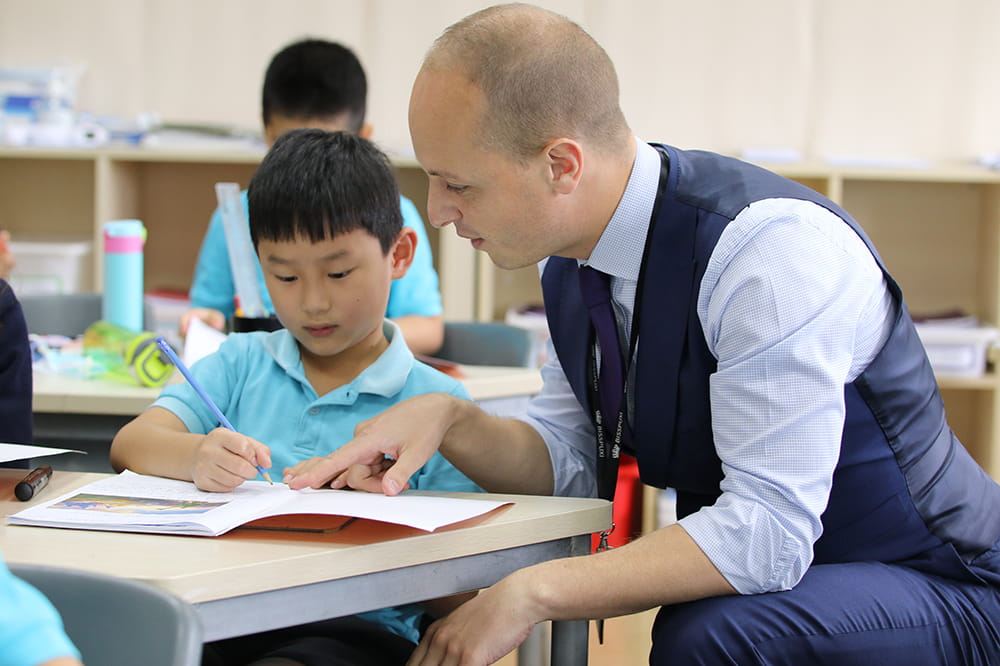Open Days
Register for our Open Day!


Our commitment to ensuring that all our students achieve as highly as they can means that we have a philosophy and practice of education drawn from a wide spectrum of international educational research and the collective experience of teachers, school leaders and educational experts within the Nord Anglia Education group. Our approach to education – High Performance Learning – is based around three key areas:
Central to our work on accelerated learning is the need to be able to know at all times what students have understood and when they are ready to move on. This means embedding assessment techniques in the heart of all lessons, with teachers constantly making decisions on the direction and pace of the learning based on the immediate needs of the students. These ideas are known as ‘assessment for learning’ and are a vital component of modern education.
Stephen Covey in his book “The Seven Habits of Highly Effective People” emphasises the importance of what he calls ‘sharpening the saw’. If we are to get the very best from the students in our care, then we must ensure that we are as well-equipped as possible to do so. We therefore brought in the world’s leading expert on assessment for learning to work with our teachers to ensure that their classroom practice and underlying beliefs are cutting edge. Professor Dylan Wiliam, Emeritus Professor of Assessment at the Institute of Education, London University and formerly Senior Research Director at the Education Testing Service at Princeton University, co-wrote the seminal paper that started the assessment for learning ‘revolution’ fifteen years ago. He has been at its forefront ever since.
Talking with teachers, Professor Wiliam first addressed the question of why should we be working on AFL? It is, of course, focussed on the crucial interface in the classroom between teacher and student, which has previously been overlooked in driving improvement in schools in favour of curriculum design and other elements of educational delivery. A great deal of research tells us clearly that improvement in assessment for learning techniques is one of the most important things we can do to increase student engagement and improve academic performance. This alone can accelerate student learning by a year or more. Put simply, in schools which do assessment for learning well, students become cleverer than they otherwise would be. As Professor Wiliam puts it: “smart isn’t something you are, smart is something you get”.
He addressed the moral imperative too: we as educators should be committed to be the best that we can be so that we can support our students and help them to thrive. Research shows that successful students who are well educated live longer, earn more money, contribute more to society and lead happier lives than their less well educated contemporaries. What we are seeking to develop in all students extends beyond the span of years they spend at school to bring lifelong benefits.
How does Assessment for Learning (AFL) improve students’ learning? It provides the all important bridge between teaching and learning. Carefully planned and thoughtful questioning at specific points in lessons is crucial because the data that it elicits informs the teaching and allows fine tuning to take place and therefore more effective teaching and learning can take place. Professor Wiliam is a very strong advocate of a no hands up approach to questioning in class. Asking for students to put their hands up does not encourage full class engagement because it allows some students to dominate and others to slip into the background and often disengage from the process. Random selection of the student to answer the question helps create a more inclusive approach, keeping students engaged and involved in the learning.
The use of feedback strategies in the classroom is also crucial, the use of mini white boards being one example. These can be used in many learning situations to help staff to check students’ understanding, with students writing answers to questions on their own mini white board to hold up in order that the teacher can get a whole class response to a question. It simply speeds up the feedback. Similarly, a traffic light system or numbered response card can be used in a similar way and at the same time help develop self- assessment skills.
Written feedback is another crucial element of AFL. Feedback and marks or grades need to be seen as two distinct and separate elements of the feedback process. The main focus when commenting on an individual should be formative assessment reflecting what the student has done well and giving clear, succinct, advice on how to improveand make the step up to the next level. In this way everyone in the process is focussed on the performance and how to improve.
Research shows that giving grades at the same time reduces the impact of feedback and the second thing that students usually wish to know when they receive a grade is how that compares with the rest of the class which is rarely particularly helpful in terms of improving the individual’s personal best performance. In fact it can be very counter-productive. There is, of course a place for grading, but at regular well- spaced intervals as part of the on-going process of tracking of students’ progress as summative assessment.
Our teachers were full of praise for Professor Wiliam’s training. He balanced research and broad context with lots of practical advice and tried and tested strategies that are being successful in other leading schools around the world. The day was insightful, impactful and challenging, reinforcing our commitment to our mission: helping our students to be the best they can be.
Chris Baker, Biology
“It was helpful to be reminded of effective AFL techniques, as well as learn some new ones. I will be using the traffic light cups in my lessons from now on.”
Daniel Shrewsbury, Year 6
“Dylan afforded us some excellent insight into how to assess in a formative way, simply, easily and effectively. I will definitely be applying certain techniques into my classroom ASAP, and I am sure that they will be an invaluable tool to assist in my assessment of the children”.
Helen McMullen, Year 1
“Dylan was as inspiring as ever, and it was grea